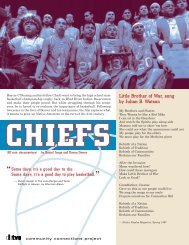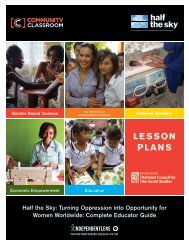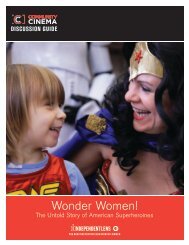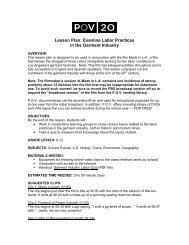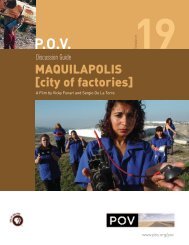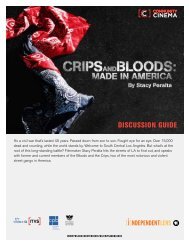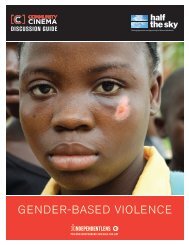economic empowerment - PBS
economic empowerment - PBS
economic empowerment - PBS
- No tags were found...
Create successful ePaper yourself
Turn your PDF publications into a flip-book with our unique Google optimized e-Paper software.
Background InformationSavings for Women That SavesWomen: Ingrid Munro and theJamii Bora Microfinance ProgramJamii Bora is the largest and fastest-growing microfinance institution in Kenya. In 1999,Ingrid Munro, a retired civil servant from the Swedish Bureau of Housing Research andformer head of the African Housing Fund (AHF), founded Jamii Bora with 50 Kenyanwomen whose only income at the time was made by begging in the street. Ingrid agreedto loan them twice as much as they agreed to save so they could invest in starting abusiness and acquiring resources that would empower them to generate income andimprove the quality of life for themselves and their families. The project was a success,and since then Jamii Bora, which means “good families” in Swahili, has grown to almosttwo hundred thousand members.Jamii Bora’s lending is concentrated on the needs of its members, and the majority of theloans are very small. The average loan size is around $90 and almost 80 percent of theloans are less than 10,000 Kenyan shillings (about $119). Many of them are starter loansthat could be as small as a few hundred shillings.The first loans usually have a dramatic effect on the lives of Jamii Bora’s members. Asillustrated by the organization, a potato street vendor who has saved KSh 400 can borrowKSh 800 and buy twice as many potatoes from a wholesale vendor. She earns dramaticallymore for every potato she sells because she bought the potatoes at wholesaleprice and is still selling them at the same price as before. Normally, after three to fourweeks she will come back for her next loan, now having saved KSh 800 and being ableto borrow KSh 1,600 to buy two sacks of potatoes. Jamii Bora has many members whostarted with loans of less than KSh 1,000 and who in one to two years grew into bigbusinesses.Where most microfinance programs in Africa have failed, Jamii Bora has succeeded. Thisis due in part to its microsavings model, which requires every member to participate inthe savings program for at least six weeks before receiving a loan and ensures that loansare never more than twice the amount of the borrower’s savings. Its facilitators also recognizethat it is not enough to just lend money—as Ingrid Munro says in the film, “Startingmicrofinance with the poorest of the poor is not something you should do if you’re notready to fight problems every day.… To get people out of poverty, you need to deal withevery aspect of their life.”Sources:»»www.halftheskymovement.org»»www.jamiibora.org»»www.ashoka.org/fellow/ingrid-munro»»aitecafrica.com/user/view/Ingrid+MunroJane Ngoiri, a Jamii Bora member, is an example of the value of microfinance programsand how they can empower individual women and help break the cycle of poverty fortheir families for generations to come. Jane is a 38-year-old single mom who grew upin the slums of Nairobi, Kenya, and dropped out of school after the eighth grade. Shemarried at age 18, but when she was pregnant with her second child, her husband informallytook a second wife. She soon found herself with small children, no home, and nomoney. Jane became a commercial sex worker for five years in order to survive. In 1999,she joined Jamii Bora, where she was pushed to save for the future. She learned to sew,left prostitution, and used her savings and a small loan to buy a sewing machine so shecould repurpose secondhand dresses into children’s clothes. Her business was a successand with the profits she bought a small home in a safe suburb and continues toprovide for her children’s future. Jane still struggles with the costs of raising a family andhas recently discovered that she is HIV positive, but now she has marketable skills, anestablished business, and a positive reputation that she can fall back on in times of crisis.Discussion guide // <strong>economic</strong> <strong>empowerment</strong>8




